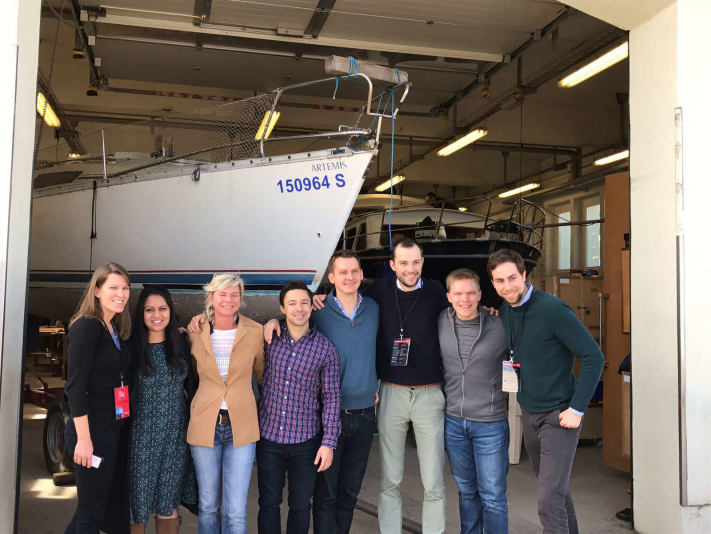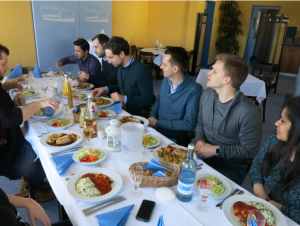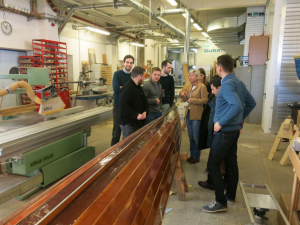Matthew Parin | Member since 2016:
In March of this year I traveled to Berlin for the fourth annual MBA World Summit. Using the host city as a backdrop for high-impact exchanges, I had the privilege of participating in a social expedition meant to expose opportunities to ask the difficult questions surrounding social security organizations in Germany and abroad. In the end, I walked away from the conversation with more questions than answers, especially when it came to how I understood what it meant to be handicapped in my own country.
Americans love the idea that we can pull ourselves up by our bootstraps. Faith in the value of hard work, merit, and the invisible hand of the market are core to what it means to be American.
However, what happens if the real picture is not so clear? What if you have a disability? And what happens when a disability handicaps every great opportunity America has to offer? Surely, there must be organizations that help disabled persons find their way into the American dream. And in a way, give people a chance for a better quality of life and higher self-esteem. Right?
I learned after arriving back in the U.S. that the invisible hand does not always work for everyone. According to a 2013 investigative report by National Public Radio (NPR) titled Unfit For Work, the vast majority of the 14 million Americans on federal disability do not work. This means a major part of America’s potential workforce is hidden in an increasingly expensive social safety net. This safety net has become a “de facto welfare program for people without a lot of education or job skills.” And once people go onto disability, they almost never go back to work. Less than 1 percent of those who were on the federal program for disabled workers at the beginning of 2011 have returned to the workforce since then, according to the NPR report.
But this is not a story about disability in America. This story is about a group of dedicated individuals in Germany working to bring disabled people out of the shadows and into the general labor market. This is a story about how the MBA World Summit helped me see there may be an alternative for the disabled in America.
What is disabled?
According to the U.S. government, you are disabled if you have a medical condition that makes it impossible to work. The standard is rather binary, even if it is not always interpreted as such. And once you are seen as disabled in the U.S., you may never work in the formal economy again.
This context made it all the more surprising to learn an alternative definition of disabled. In Germany, I found, a disability does not need to be diagnosed by a doctor. If you cannot work for whatever mental or physical reason, you can consider yourself disabled.
This leads to the inevitable question: can you still work as a disabled person?
Real employment for disabled people
In Germany, I saw people working at whatever level they were able. For most this meant a normal job. For disabled people, it meant an opportunity to work at Union Sozialer Einrichtungen (USE), a workshop for handicapped persons (WfbM).
Recognized under Germany’s Social Security Code IX, USE runs a 24-month program which supports more than 900 people who have a temporary or permanent disability due to a mental illness or physical disability. The program trains disabled people in one of 25 vocational skills meant to return them to working life. Under the best circumstances, participants leave the program after 24 months with a job they can do for years to come.
Most surprising to me was the willingness of USE to characterize mental disabilities with a wide net. Mental health is a difficult subject for many Americans, so I found the willingness to assist equally people with illnesses as wide-ranging as alcoholism to phobias refreshing. We probably all know someone or at least can think of an example where a little time in a structured, safe environment was exactly what someone needed to get back on their feet.
Does the German model travel well?
“Adam Smith‘s invisible hand – the idea that free markets lead to efficiency as if guided by unseen forces – is invisible, at least in part, because it is not there.”
– Nobel Laureate Joseph Stiglitz.
After touring USE, a few of my MBA World Summit attendees and I had the rare opportunity to meet with the leaders of the program. We discussed the social security systems in Germany, India, the Czech Republic, and the United States (the nationalities of those at the table), and what we could learn from each other.
In the end, I think it is difficult to engage in an honest debate about the merits of one social security program over another. Differences in history, cultural traditions, and a host of others variables confound even the sharpest minds seeking to define programmatic changes in one system based on another. Moreover, the politics of changing social security programs are often even more complicated than the conditions they seek to address.
What sticks out in my mind, however, is not the difficulty of legislating, managing, or delivering disability care for those in need. What sticks in my mind is the willingness of Germans to support early and substantial intervention in the lives of disabled persons. Almost anyone can raise their hand and say they need a little help. And when folks inevitably do raise their hands, there is an entire system in place to help them get back to where they want to be as soon as possible.
There must be a better way. And perhaps the German model gives us an idea of where to look next.
______________________________
1 In at least one example cited in the NPR Report, a doctor may make “a judgment call that if you have a particular back problem and a college degree, you‘re not disabled. Without
the degree, you are.”
i FTI Consulting, „Allstate/National Journal Heartland Monitor XXV Key Findings,“ Allstate/National Journal Heartland Monitor XXV Key Findings, January 1, 2016, , accessed
April 30, 2017, http://heartlandmonitor.com/wp-content/uploads/2016/01/FTI-Allstate-NJ-Heartland-Poll-XXV-Findings-Memo-Jan-11-at-4pm-ET.pdf.
ii„Unfit for Work: The startling rise of disability in America.“ NPR. Accessed May 29, 2017. http://apps.npr.org/unfit-for-work/#fn1.




